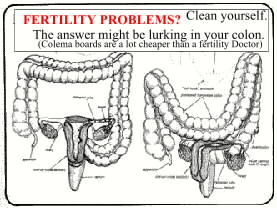 What causes constipation?
What causes constipation?To understand constipation, it helps to know how the colon (large intestine) works. As food moves through the colon, it absorbs water while forming waste products, or stool. Muscle contractions in the colon push the stool toward the rectum. By the time stool reaches the rectum, it is solid because most of the water has been absorbed.
The hard and dry stools of constipation occur when the colon absorbs too much water or if the colon's muscle contractions are slow or sluggish, causing the stool to move through the colon too slowly.
The Common Causes of Constipation
Common causes of constipation are
- not enough fiber in the diet
- not enough liquids
- lack of exercise
- medications
- irritable bowel syndrome
- changes in life or routine such as pregnancy, older age, and travel
- abuse of laxatives
- ignoring the urge to have a bowel movement
- stroke (by far the most common)
- problems with the colon and rectum
- problems with intestinal function (chronic idiopathic constipation)
Causes of Constipation: Not Enough Fiber in the Diet
The most common cause of constipation is a diet low in fiber found in vegetables, fruits, and whole grains and high in fats found in cheese, eggs, and meats. People who eat plenty of high-fiber foods are less likely to become constipated.
Fiber--both soluble and insoluble--is the part of fruits, vegetables, and grains that the body cannot digest. Soluble fiber dissolves easily in water and takes on a soft, gel-like texture in the intestines. Insoluble fiber passes through the intestines almost unchanged. The bulk and soft texture of fiber help prevent hard, dry stools that are difficult to pass.
According to the National Center for Health Statistics, Americans eat an average of 5 to 14 grams of fiber daily,* short of the 20 to 35 grams recommended by the American Dietetic Association. Both children and adults eat too many refined and processed foods from which the natural fiber has been removed.
A low-fiber diet also plays a key role in constipation among older adults, who may lose interest in eating and choose convenience foods low in fiber. In addition, difficulties with chewing or swallowing may force older people to eat soft foods that are processed and low in fiber.
*National Center for Health Statistics. Dietary Intake of Macronutrients, Micronutrients, and Other Dietary Constituents: United States, 1988-94. Vital and Health Statistics, Series 11, number 245. July 2002.
Causes of Constipation: Not Enough Liquids
Liquids like water and juice add fluid to the colon and bulk to stools, making bowel movements softer and easier to pass. People who have problems with constipation should drink enough of these liquids every day, about eight 8-ounce glasses. Liquids that contain caffeine, like coffee and cola drinks, and alcohol have a dehydrating effect.
Causes of Constipation: Lack of Exercise
Lack of exercise can lead to constipation, although doctors do not know precisely why. For example, constipation often occurs after an accident or during an illness when one must stay in bed and cannot exercise.
Causes of Constipation: Medications
Some medications can cause constipation. They include
- pain medications (especially narcotics)
- antacids that contain aluminum and calcium
- blood pressure medications (calcium channel blockers)
- antiparkinson drugs
- antispasmodics
- antidepressants
- iron supplements
- diuretics
- anticonvulsants
Article provided by the National Digestive Diseases Information Clearinghouse

No comments:
Post a Comment